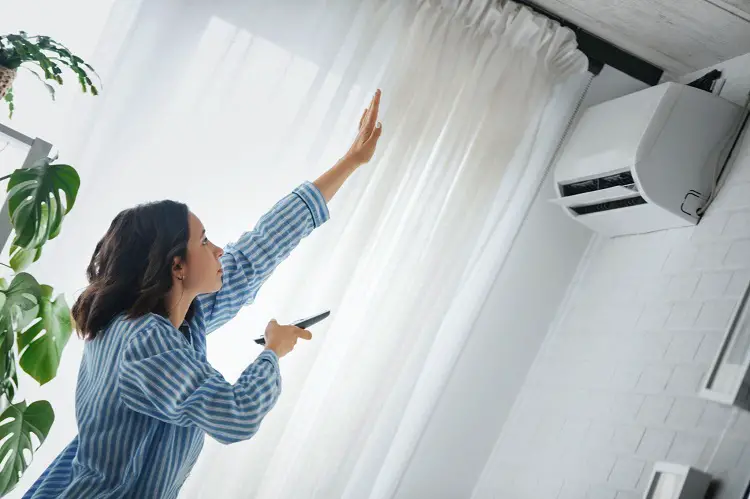There’s no better feeling than coming home to a cool room after spending long hours under the sun.
When you realize that your room is no longer that cool space you used to come home to, you begin to wonder, why is my room so hot? It could be a fault in the venting system or dirty air filters in the air conditioner.
But that is not all. There are several other possible reasons why your room is hotter than other rooms.
And we have explored the closest possibilities for why your room is so hot.
Why is My Room So Hot?

The joy of coming home to a cool and comfortable room is unmatched. You feel the day’s stress evaporate under the atmosphere of your comfort zone.
Having this luxury taken away can be such a dreadful feeling. Sadly it happens, and there are some peculiar reasons why it happens.
You may notice that your room seems hotter than the rest of the rooms in the house and may wonder if there is anything they’re doing differently that you’re not.
If you’ve noticed that some rooms are hotter or colder than others rooms, check for the following:
1. Dirty Air Filters
Filters in the air conditioner are designed to filter the air entering the air conditioner from the atmosphere to produce clean and breathable air.
This air sometimes packs debris and dust along with it, and if you don’t clean them up regularly, they can get clogged up with dirt, which will eventually cause heat and release hot air into your room.
To clean your filter, turn off the AC, remove it, and vacuum the filter. Then wash the filter and reinstall it.
2. Insufficient Return Air Vents
Your system is most likely not receiving enough air intake if the same room is always too hot or too cold and the air filter looks like it is about to be sucked into the return air vent opening.
It may be necessary to install an additional return air vent in the room if that doesn’t solve your problem. Use a lower MERV rating filter to allow more air to pass through.
3. Closed Vents
Vents are designed to create a balance between the outside temperature and your room temperature.
They have covers with tiny holes to let in air, but when they’re closed, it’ll creates an unbalanced temperature such that there would be little hot air leaving and less cool air coming in from outside. And this will cause heat in your room.
4. Opened Windows
When your windows are left open while the air conditioner is working, the cool air from the air conditioner will escape to the surrounding, creating uneven temperatures in your room.
5. Old or Poorly Insulated Windows
Having old windows in your home can contribute to the problem.
The temperature outside affects the temperature inside, so if your windows are old or improperly sealed, certain rooms may feel warmer than others.
Re-caulking your windows can help prevent air loss, keeping your home’s interior cooler and your exterior hotter. If re-caulking is not an option or does not work, you may need to replace your windows.
6. Windows Receiving Direct Sunlight
It can be difficult to keep your home cool during the summer if your windows receive direct sunlight – even if they have been updated.
Planting trees near your windows can provide a natural (and beautiful) barrier between the sun and your home if this is a problem for your home. If that can’t work, look into awnings or blackout curtains.
7. The Nature of Your Home
In multi-level single-family homes, the top story tends to be warmer in the summer and cooler in the winter.
This is because – the thermostat is usually on the first floor, and the top floor has more direct contact with the outside elements.
To solve this problem, keep the fan setting on “On” around the clock since this will keep airflow circulating in your home, even when the air conditioner cycles off.
8. Poor Home Insulation
Your home may not retain cold air during the summer because of insufficient or uneven insulation. This is especially true if you live in an older Florida home.
Heat sinks in if the insulation is inadequate or missing, so you don’t need a powerful AC to keep you cool. The cold air escapes, and the heat always finds its way back inside your room.
9. Electronics and Appliances
There is a lot of heat generated by computers, especially those with high-end graphics cards. Other electronics, such as monitors, televisions, lights, and clocks, also generate heat.
Turn off these things when they are not in use, and if you haven’t already, switch to LED light bulbs for lamps and another lighting.
Your oven, stove, and other kitchen appliances can also dramatically influence your home’s temperature, so try only to use these appliances when you need to.
10. Crushed Air Ducts
If your air ducts are crushed or kinked, the air temperature in your home will be uneven and different.
Apart from these, an unbalanced air conditioning and heating system is a possibility.
Even though this is usually a rare occurrence, it may be why your room feels hot even after running the air conditioner for hours. If this is the case, you need an air conditioner expert for air balancing.
What is Air Balancing
Air balancing is a system that ensures all the rooms within a home get the same temperature simultaneously. When the reverse is the case, there’s an unbalanced cool and hot air system.
Causes of Unbalanced Systems and Their Solutions
During AC installation, larger rooms get larger ducts to supply the air they need, and smaller rooms get smaller ducts.
Dampers are installed on the main ducts close to the inside unit of the air conditioner and the ducts to fine-tune their function of these ducts by allowing you to adjust the amount of air entering each room.
If there’s a mismatch between the two, there would be an unbalanced system. However, these are not the only causes of an unbalanced system; others are:
Multiple Levels
A house with multiple levels is difficult to balance out. You must carefully analyze the heat rising and the long ducts used to ensure that it is evenly distributed.
Solution
The best way to ensure that air is evenly distributed in a multiple leveled home is to divide the house into different zones.
Each zone has a thermostat or temperature sensor to automatically adjust the temperatures in the rooms mapped under these zones.
Uninsulated Long Runs of Ducts
No matter how cool the air is, if it travels through long ducts in unconditioned areas, it’ll heat up, and rooms farther away from the AC will be hotter than others closer to the air conditioner.
Solution
You can fix this easy issue by simply insulating the ducts to cool the air. Although simple, getting the work done may be more complex and involve restructuring your home’s ducting system.
Inadequate Return Vents
Large homes with a single vent suffer from inadequate air distribution because the single vents cannot suck up warm air from far rooms.
Solution
You can either increase the number of return vents or leave your windows and doors open to create a balance in the airflow.
Undersized AC System
If you’re using an air conditioner that is too small for a large room, little cool air will circulate. Equally, if the air conditioning system is oversized, it will shut off quickly and leave some rooms hotter or cooler.
Solution
Combine large air conditioners with fans to help circulate the air to other parts of the house, or you can increase the number of air conditioners if you use a small system.
Room Use
Not many people know how they use their rooms can affect the air system. For instance, you may discover that your office is hot because you use computers, servers, and other electronic systems that generate heat.
If you use heat-generating appliances in your room, it could be the reason it is hotter than in other rooms.
Solution
You can either create a separate room for the appliances or call an air conditioning company to adjust the airflow in your room using dampers in the ducts.
Renovations
Adding or removing walls during renovation can upset the airflow system in your room.
Solution
Depending on the change’s extent, you can add an extra air conditioner or run additional ducts to the old ones.
Related Post:
Conclusion
Your airflow system can be so unbalanced that you’d wonder, “why is my room so hot?”.
At this point, it is difficult to point out the reason considering that there are several causes of an unbalanced system.
If you’re familiar with the ducting system in your home, you can tell if the problem is with the duct. However, there’s always the option of calling an air conditioner company to help check and fix air issues with your air conditioner.

